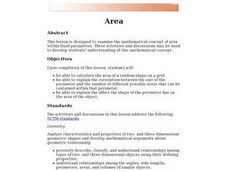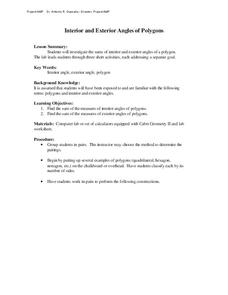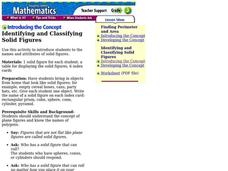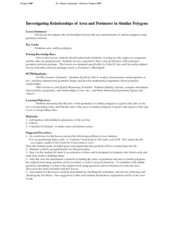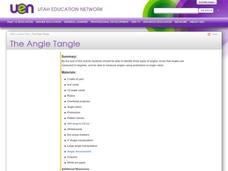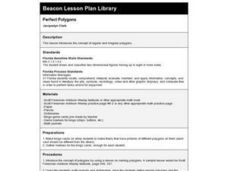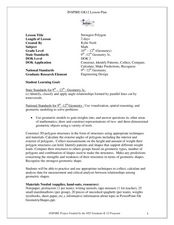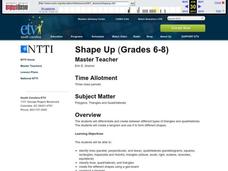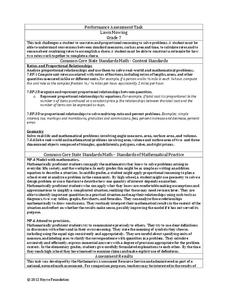Curated OER
Area Applet
Elementary math classes calculate the area of a shape and explain the correlation between the size of the perimeter and the areas that can be contained within that perimeter. They also explain the effect the shape of the perimeter has on...
Curated OER
Small and Large Squares
Young mathematicians classify squares according to attributes. They sort squares according to specific attributes. Young scholars explore squares in repeating patterns and order squares according to size. Engaging extension activities...
Curated OER
SuperShapes, Part 1; "Tri"ing Triangles
An outstanding lesson on triangles awaits your math scholars. Learners focus on the triangle, which is the strongest of all polygons. They see the role that triangles play in the design of buildings, and learn about triangle...
Curated OER
Exploring Geometric Figures
Tenth graders explore mathematics by participating in hands-on daily activities. Learners identify a list of different shapes and classify them by shape, size, sides and vertices. They utilize tangrams and geometric pieces to gain...
Curated OER
Polygons
In this math worksheet, students classify the six polygons. Then they answer the questions related to the geometric properties of the shapes.
Curated OER
Interior and Exterior Angles of Polygons
Students identify interior and exterior angles of polygons. In this geometry lesson, students add interior and exterior angles of polygons. They use angle theorems to solve the problems.
Curated OER
Identifying and Classifying Solid Figures
Students identify and classify solid geometric figures. In this geometry lesson plan, students bring in objects that look like solid shapes and identify their attributes. Students identify the number of surfaces and faces on each figure.
Curated OER
Identifying and Classifying Solid Figures
Students identify solid figures. In this classification lesson, students recognize and name solid figures. Students identify which figures contain polygons and rectangles. Students practice counting vertices, faces and edges.
Curated OER
Investigating Area and Perimeter of Polygons.
Student sinvestigate the area and perimeter of polygons. They differentiate between similar and congruent polygons.. They identify the ratio and proportions of the sides and angles of polygons.
Curated OER
Right Triangles
Learners classify triangles and make connections regarding angle measurements and attributes of acute, right, and obtuse triangles. They listen to teacher define and explain triangles. Everyone imagines a place where a broken wing for a...
Alabama Learning Exchange
What You Know About the Bermuda Triangle?
Get lost in the classifications. Using the backdrop of the Bermuda Triangle, pupils classify it by angle and side measures. They also learn information about the triangle and its history.
Curated OER
Connecting Algebra and Geometry Through Coordinates
This unit on connecting algebra and geometry covers a number of topics including worksheets on the distance formula, finding the perimeter and area of polynomials, the slope formula, parallel and perpendicular lines, parallelograms,...
Curated OER
Angles
Fourth and fifth graders investigate angles and name them according to the criteria for obtuse, acute, and right angles. They examine a human-made yarn pattern on the floor of their classroom and identify angles, vertices, and types of...
Beacon Learning Center
Perfect Polygons
Don't worry if you do not have the mentioned textbook; there is enough material here for you to carry out a pertinent polygon plan. After introducing your class to various polygons and the prefixes that help identify them, hand out...
Curated OER
Classifying Transformations
Students analyze different polygons by shapes and sides. In this geometry lesson, students differentiate between similar and congruent polygons. They name the different polygons based on the number of sides.
Curated OER
Strongest Polygon
Students define and identify shapes by name. In this geometry lesson, students construct, identify and compare polygons based on the number of sides. They classify each shape based on their angle sum theorem.
Curated OER
Geometry Journal: Classifying Solids
In this geometry worksheet, 10th graders respond to journal prompts related to prisms and classifying solid shapes. The two page worksheet contains nine questions. Answers are included.
Curated OER
Geometric Shapes
Students identify polygons. In this geometric shape instructional activity, students explore the characteristics of polygons. They identify polygons, and classify triangles according to their sides and angles. Students...
Pennsylvania Department of Education
A Geometric Scavenger Hunt
Fifth graders connect their knowledge of polygons and polyhedrons. In this geometric shapes lesson, 5th graders identify and classify two- and three-dimensional objects. Students construct a polyhedron out of polygons and describe their...
Curated OER
Shape Up
Middle schoolers explore differents types of triangles and quadriaterals. In this polygon lesson, students model identify and compare two and three dimensional geometric figures. Middle schoolers create tangrams and discover the...
Curated OER
Volume and Surface Area of Right Rectangular Prisms
Students identify the formulas for three-dimensional figures. They use manipulatives to model problems. Students create foldables and explain volume and surface area. Students complete worksheets and classify solids. Students sing a...
Noyce Foundation
Lawn Mowing
This is how long we mow the lawn together. The assessment requires the class to work with combining ratios and proportional reasoning. Pupils determine the unit rate of mowers and calculate the time required to mow a lawn if they work...
Alabama Learning Exchange
Pennies, Pennies and More Pennies
Learners determine the number of pennies needed to fill a room. In this pennies lesson plan, students work in groups to determine the number of pennies needed to fill a room. They compute the probability of the head of a pin...
Curated OER
Classifying Quadrilaterals
Students cut out three different shapes and put them in the correct categories of parallelograms, trapezoids, and trapeziums. In this parallelogram lesson plan, students explain the sums of the angles of a triangle and a quadrilateral.


